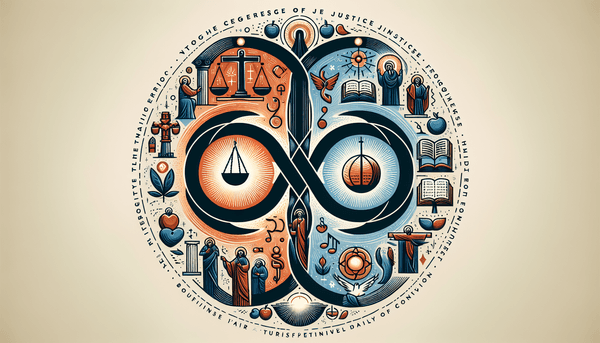Dying Daily to Fleshly Desires
In his bold declaration, 'I die every day!' (1 Corinthians 15:31), the Apostle Paul captures the essence of the Christian's daily struggle against sin. Paul's admission isn't one of defeat but rather a testament to his commitment to living out the transformative power of Christ. In Romans 6:6-7, Paul further explains that our old self was crucified with Christ, rendering our sinful nature powerless. This daily dying to sin is not an easy task—it is a conscious, intentional surrender that frees us from the enslavement of sin. Likewise, in Galatians 5:24, we are reminded that those who belong to Christ have crucified the flesh with its passions and desires. These passages collectively urge us to live in obedience to Christ, crucifying our fleshly desires each day. Through prayer, immersion in God's Word, and reliance on the Holy Spirit, we can find the encouragement and strength to overcome the temptations that once held us captive.
Living Through Christ: The Transformative Power of Faith
Galatians 2:20 stands as a profound truth about the transformative power of faith in Jesus Christ. It encapsulates the essence of the Christian life, where the old self is crucified with Christ, and a new life begins, powered by faith in the Son of God. This is not a physical death but a spiritual one, where we renounce our former ways of living that were dominated by sin. As Paul states, 'It is no longer I who live, but Christ lives in me.' This indwelling of Christ, facilitated by the Holy Spirit, marks the beginning of a life that reflects Jesus more than ourselves. This transformation renews our values, desires, thoughts, and actions to align with those of Christ, who loved us and gave Himself for us. Living by faith in Jesus means that our daily conduct is not based on human effort alone but on the sustaining grace of God working within us (Ephesians 3:17).
Understanding God's Righteous Anger
Righteous anger, as exhibited by God, is distinct from the flawed, often self-centered, human anger. It is an anger born out of love for justice and righteousness. Ephesians 4:26-27 speaks to the nature of anger, admonishing believers not to sin in their anger. When we look at instances such as Jesus cleansing the temple (Matthew 21:12-13), we see an expression of God's anger against corruption and injustice. This divine anger is always purposeful, aiming to correct and restore rather than to harm. Understanding God's righteous anger can help us align our hearts with His and spur us to take action against injustice and sin in our lives and the world around us. By recognizing God's holy disdain for sin, we can better appreciate the gravity of living a life that seeks to honor Him in all aspects.
Seeking God's Kingdom and His Righteousness
To seek first the kingdom of God and His righteousness is a directive laden with spiritual depth (Matthew 6:33). This pursuit calls for a focus that transcends earthly concerns, directing our gaze upward to the eternal and the holy. By setting our minds on things above (Colossians 3:2), we begin to understand that our true citizenship is in heaven, and our lives should reflect that heavenly reality. James 4:8 encourages us to draw near to God with the promise that He will draw near to us, highlighting the reciprocal nature of our relationship with the Divine. As we prioritize God's kingdom and righteousness, we find that our own needs and desires are met in ways that far exceed our expectations. This spiritual prioritization assures us of not just material provision but also, and more importantly, of our inheritance in the kingdom of heaven.
Conclusion
The call to live a transformed life in Christ is an invitation to experience the fullness of God's love and purpose for us. Dying daily to our flesh and seeking God's kingdom are not just lofty ideals but practical, daily commitments that shape our spiritual journey. They require vigilance, perseverance, and a heart willing to be molded by God's hands. Reflecting on teachings such as the Fruit of the Spirit can help us embody these commitments. As we reflect on the teachings of Paul and the greater biblical narrative, let us be encouraged to press on toward the goal of a life that is truly lived through Christ. May we find joy and strength in the knowledge that, as we draw near to God, He draws near to us, guiding us every step of the way.






